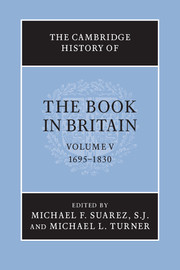Book contents
- Frontmatter
- Introduction
- PART I THE QUANTITY AND NATURE OF PRINTED MATTER
- PART II ECONOMIC, LEGAL AND CULTURAL CONTEXTS
- 3 The book as a commodity
- 4 Copyright, authors and censorship
- 5 The rise of the professional author?
- 6 Women and print: readers, writers and the market
- PART III THE TECHNOLOGIES AND AESTHETICS OF BOOK PRODUCTION
- PART IV THE BOOK TRADE AND ITS MARKETS
- V BOOKS AND THEIR READERS
- Abbreviations used in bibliography
- Bibliography
- Index
- Frontispiece
- Plate section
- References
5 - The rise of the professional author?
from PART II - ECONOMIC, LEGAL AND CULTURAL CONTEXTS
Published online by Cambridge University Press: 28 September 2010
- Frontmatter
- Introduction
- PART I THE QUANTITY AND NATURE OF PRINTED MATTER
- PART II ECONOMIC, LEGAL AND CULTURAL CONTEXTS
- 3 The book as a commodity
- 4 Copyright, authors and censorship
- 5 The rise of the professional author?
- 6 Women and print: readers, writers and the market
- PART III THE TECHNOLOGIES AND AESTHETICS OF BOOK PRODUCTION
- PART IV THE BOOK TRADE AND ITS MARKETS
- V BOOKS AND THEIR READERS
- Abbreviations used in bibliography
- Bibliography
- Index
- Frontispiece
- Plate section
- References
Summary
The standard model of authorship in the ‘long eighteenth century’ (c.1660–1830) is a narrative of transformation and modernization. In this model the eighteenth century witnesses the ‘emergence’ of ‘modern authorship’ (whether one dates the symbolic moment of ‘birth’ as the Copyright Act (8 Anne c. 21) of 1710 or Johnson’s famous letterto Chesterfield in 1755, or even as early as Dryden’s distinction in the preface to All for love (1678), between ‘men of pleasant conversation’ and ‘true poets’ who write for ‘subsistence’). As late as 1675 the symbolic centre of literary culture is still the court, but by 1800 the centre is the ‘literary marketplace’ of the book trade. The writer at the beginning of the period is typically a financially independent gentleman amateur or else a dependant of the patronage system. By 1800, the writer, now a proud and respected ‘professional’ man or woman who deals directly with booksellers, has been freed from the shackles of patronage, and can aspire to make a living by the pen. What was once a ‘scribal’ culture, in which new writings typically circulated in manuscript within a relatively small set of elite readers, becomes ‘print culture’, in which writing is reduced to standardized type, reproduced in thousands of copies and distributed to a vastly increased readership. Not only does the number of readers increase dramatically; so toodoes the number of printers, writers, titles and books. As Johnson claimed, the eighteenth century could be called ‘The Age of Authors’. The changes in the material and legal conditions of authorship – from ‘print technology’ to improved systems of distribution and the century-long debate about copyright – help explain the larger change in the way in which authorship was conceived. From the hordes of authors a few familiar figures consistently emerge: Dryden, the ‘professional’ who resists the cultural authority of ‘amateurs’ such as the Earl of Rochester; Pope, the first writer to make a living by his pen (unless that honour be accorded to Aphra Behn); or Johnson, who by applying his talents to a variety of humble writing tasks virtually ‘re-invented authorship’.
Keywords
- Type
- Chapter
- Information
- The Cambridge History of the Book in Britain , pp. 132 - 145Publisher: Cambridge University PressPrint publication year: 2009
References
- 1
- Cited by

